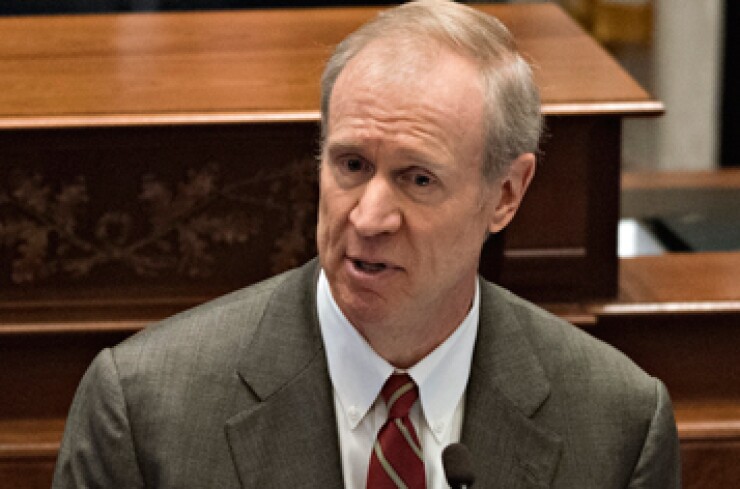
CHICAGO – The spat between Illinois Gov. Bruce Rauner and the Chicago Public Schools has turned into an argument about the school district's authority to borrow.
The Illinois Board of Education could block future CPS borrowings if it sees red flags during its investigation of CPS finances, Rauner said. CPS countered that the school code statutes exempt the district from such a ban.
Rauner's comments came in response to reporters' questions about the state board's decision last week to launch a financial investigation of CPS finances.
During the questioning, Rauner resurrected accusations from Chicago City Hall that he timed comments last month, backing legislation that would allow for a state takeover and possible Chapter 9 bankruptcy, to hurt CPS' planned bond sale. The warning rattled the market along with new rating downgrades and labor unrest, forcing the district to delay and then scale back the deal before completing it early this month at a 8.5% interest rate.
It's "completely false" that they were designed to hurt the deal, Rauner said of his comments.
"The simple fact is, the state board of education, if it chose to, if it determined that any school district was in financial duress…has the right, the legal authority, to block any debt offerings," Rauner said. "The state board has not ever chosen to do that for the city of Chicago. I hope that never becomes necessary, but we've got to be able to take action and step in."
The state does not have the authority, based on CPS' current fiscal designation, but that could change, according to the Rauner administration, which later elaborated on the governor's comments.
"ISBE placed CPS under financial watch," the administration said. "If ISBE further determines that CPS is in financial difficulty, then the school code prohibits CPS from issuing bonds or otherwise borrowing money until the district develops a financial plan to be approved by ISBE. We need full disclosure of CPS financials to determine the appropriate next steps to protect students and taxpayers."
The administration pointed to section 1A-8 of the state's school code that says when a school district is in "financial difficulty" that "no bonds, notes, teachers order, tax anticipation warrants or other evidences of indebtedness shall be issued or sold by a school district or be legally binding upon or enforceable against a local of education of a district certified to be in financial difficulty unless and until the financial plan required under this section has been approved by the State Board of Education."
"The governor has come up with a number of novel legal theories, but I would just refer him back to the statute," schools chief Forrest Claypool said during a public appearance.
If a district is subject to Article 34A, the School Finance Authority Act, the rules are different and CPS, which falls under that article as a district that serves a population of more than 500,000, asserts that it's exempt from the bond oversight.
The district must provide the state with the requested information but the only action that can be taken if found to be in financial difficulty is notification of that status change to the governor and mayor.
Rauner's administration countered that CPS is no longer subject to Article 34A because it applied only when the district's reform board existed. It has been disbanded. CPS is now governed by Article 34, which means CPS can be required to develop a financial plan and would be prohibited from issuing bonds during that period, the administration said.
The comment adds to the acrimony between Rauner and CPS and won't help CPS' already strained relationship with the market. CPS has relied heavily on market access in recent years to borrow to make up for its deficits and on banking relationships for short-term credit lines.
The state board is seeking the district's last four annual audits, monthly bank reconciliations by fund, annual and projected cash flow by fund, three-year financial projections and assumptions, three-year financial plans to balance its budget, monthly payroll amounts, information on many major contracts and negotiated labor contracts, and health insurance assumptions. The board will use the financial information being sought to determine if conditions exist for "certification of financial difficulty."
Questions over the extent of the state's authority have come under the spotlight following Rauner's oversight and bankruptcy comments and his directive to the board to look for candidates to run the district in the event of a state takeover. The state board has authority to review CPS finances and shift its designation, but the district is exempt under existing school district oversight statutes by the language that excludes districts with a population of more than 500,000.
The board also has requested the district's alternate revenue bond amortization schedules to determine how much general state aid or other revenues must be diverted from operations for debt service. The district issues most of its debt – including its recent $725 million deal -- under a state-allowed alternate revenue bond structure.
Tension between the Rauner administration and CPS has continued to rise in recent weeks. Rauner has said there will be no state bailout of the district, which is seeking $480 million in state pension funding help to balance its current budget. Rauner has suggested help could be forthcoming if Chicago Mayor Rahm Emanuel backed his governance and policy proposals opposed by the legislature's Democrats.
In his budget address, Rauner accused the district of getting a special financial deal. CPS has fired back at the governor arguing the district is shortchanged and suggesting he focus his attention on trimming the state's $7 billion bill backlog that is skyrocketing due to the lack of a fiscal 2016 state budget.





